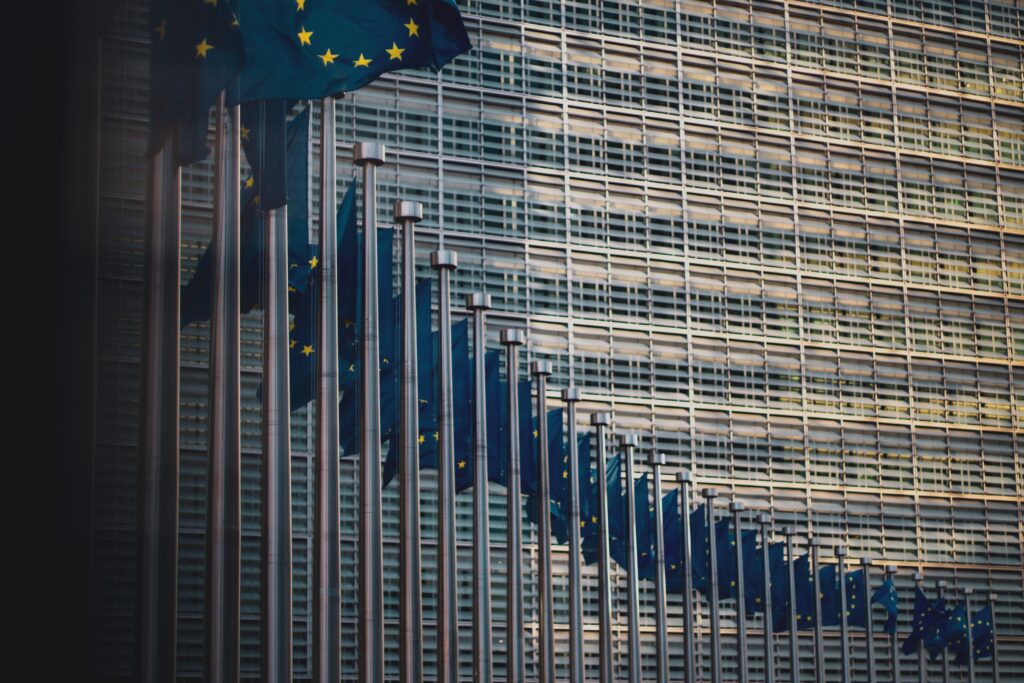As the world becomes ever more complex, the lines between concepts and competencies become convoluted. National issues blur into the international and civilian interests dissect the military. Within the European Union (EU) this blurring is nothing new. Since even before its inception in its current form, the EU has bridged regional, national and continental issues and has been mandated with both internally- and externally-focused tasks. Nowhere is this overlapping more evident than in the policy areas of space and defence. Over the past decade, the EU has increasingly integrated these policy domains, raising questions about the implications of this development for the EU’s position within the international community. This paper will explore this increasingly blurred line by taking a look at the “watershed” European space policy (ESP) is currently at, through an analysis of the establishment of the EU’s Agency for the Space Programme (EUSPA) (Klimburg-Witjes, 2021). Using the advent of this agency as a case study, this paper will outline how this development has shifted the EU’s defence and space policies and explore how realism and liberalism coexist at different levels, with a focus on liberal multinational cooperation within the EU and realist posturing at an international level.
EU Agency for the Space Programme
EUSPA was established in 2021, replacing the European GNSS Agency and expanding its mission to encompass other space programs (EUSPA, 2022). The agency sits under the umbrella of the EU’s Common Security and Defence Policy (CSFP), with the goal of ensuring the EU’s autonomy in the space domain and contributing to the block’s security and defence objectives.
EUSPA is responsible for ensuring secure and reliable access to EU space capabilities, such as Galileo and Copernicus, for EU institutions, member states, and other users. This involves managing and operating existing programs and developing new space-based systems and services (Regulation (EU) 2021/696, 2021). Notably, the agency is also tasked with protecting the EU’s space infrastructure on the ground and in orbit against potential threats. This responsibility includes protecting assets from cybersecurity threats, space debris, and natural hazards. To do this requires overlapping and liaising, not only with the European Space Agency (ESA) (the non-EU civilian space conglomerate), but with the Space and Defence Division of the External Action Service (EAS) and with counterparts within the European Defence Agency (EDA). In terms of specifically defence-based tasks, EUSPA plays a leading role in supporting EU military operations through its space programs by providing navigation, communication, and Earth observation services. The agency also collaborates with the EDA to develop dual-use space technologies that can benefit both civilian and military users (European Defence Agency, 2021). For instance, the agency’s development of military-grade Galileo receivers provides precise positioning information to military forces in the field. It is these ‘dual-use’ or even overtly military technologies that highlight the need for further research to be conducted on this shift in ESP.
Klimburg-Witjes (2021, pp. 529) asserts that what started as a project for peaceful harmonisation and cooperation has been “increasingly replaced by a vision of increased synergies between civil and defence-related space application(s) and (of) space as a realm of EU security.” It is clear that this shift mirrors developments around the world. The then-European Commissioner for the Internal Market Elzbieta Bienkowska has made this very clear. “The U.S. has created a Space Force. We need, on the medium to long-term, a European Space Force (…) We need to set in motion a process to define Europe’s vision for space” (Peck, 2019). While the actual establishment of a force comparable to that of the U.S. Space Force seems like a distant notion, the copy and paste mentality of the EU can be seen quite transparently here and the process of defining that vision is clearly being set in motion.
This vision involves the transformation of existing agencies and architectures and the consolidation of competencies into rebranded entities. It is through this process that the cargo ship that is the EU can begin to change course and redirect itself in line with its peers in the global arena. Overall, EUSPA’s mission, and the wider shift in policy that its establishment represents, is to enhance the EU’s autonomy in the space domain and advance its position as a space power. This means guaranteeing access to space, independent of the U.S. or other nations. This relatively new agency consolidates the scattered and incoherent architecture of the EU’s space-based defence policy and represents an announcement of aspiration to the family of nations.

Internal Cooperation: Liberals at Home
Liberalism is a school of thought within International Relations (IR) that emphasizes the importance of cooperation, democracy, and institutions in the promotion of peace and prosperity among nations. Liberalists view the international system as a society of states, in which countries can engage in peaceful and mutually beneficial relations through cooperation and the establishment of international institutions. These institutions include the United Nations, the World Trade Organisation and, notably for this paper, the European Union. Furthermore, “liberalism seeks to project values of order, liberty, justice and toleration into international relations” (Dunne, 2017, pp. 118). Liberalists argue that countries that respect individual rights and freedoms are more likely to engage in peaceful and cooperative relations with other countries, as they share a common commitment to the principles of liberty and democracy.
The collaborative nature of the consolidation of defence and space policies reflects a liberal outlook. It represents a commitment to cooperation and the formation of multinational bodies and processes that standardise governance and policy development among member states. These efforts to establish common defence and space policies, and the instruments and organisation required, are based on the idea of collective security. This involves the pooling of resources. EUSPA represents a multinational effort to combine resources with the net effect of a smooth and commonly understood mechanism (among member states) for collaboration. This reduces ad hoc and unpredictable policy disputes and fosters cohesion within the block. The idea of collective security is a staple of a branch of liberalist thought called liberal institutionalism. Theorists in this area assert that “institutionalised cooperation among states opens up unprecedented opportunities to achieve greater international security” (Baylis, 2019, pp.243). The secondary effect this has is an outward one. Collectively developing these policies and procedures leads to a larger, and seemingly stronger, grouping of nations in these areas. When running through hypothetical conflict scenarios, countries that have pooled their resources together are a much less attractive target due to their size, in comparison to distinct, isolated states. This can be said to reduce the likelihood of conflict with third parties.
However, the move away from the EU’s focus on civilian space policy and peaceful exploration of space is inconsistent with the liberal emphasis on the promotion of peace and stability. Arguments can be made that military power is needed as a preventative measure against conflict, yet this move still goes against the core sentiment of liberalism (Dunne, 2019, pp. 127). On the whole though, the cooperation that created EUSPA and the shift in space and defence policies demonstrates an adherence to the principles of liberalism in regard to cooperation among states and the foundation of international bodies in promoting peace and security.
External Assertion: Realists Away
Realism is a school of thought within IR that revolves around the importance of power, self-interest, and the struggle for survival in shaping the behaviour of states. Realists view the international system as anarchic (Dunne & Schmitt, 2019). This means that there is no centralised authority, such as a world government, to regulate the behaviour of states. States are viewed as the primary actors in the international arena. Under these assumptions, the balance of power between states is the key determinant of international stability and international cooperation is only possible when it serves the interests of individual states.
The shift in ESP can be mapped quite succinctly to the core characteristics of realist thought. Firstly, realism argues for the placing of a strong emphasis on national security and the pursuit of national interests as the primary goal of international relations. For the purpose of this paper, national interest refers to the interests of the EU. This is borne out as Europe collectively views its space policy as a way to enhance national security, particularly through the development of space-based surveillance and communication systems that can be used for military purposes (Klimburg-Witjes, 2021).Secondly, the importance of maintaining a balance of power between states is core to realism (Dunne & Schmitt, 2019, pp. 107). The blurring of defence and space policy reflects a realist concern with maintaining a balance of power in space, particularly in light of the increasing militarisation of space by other major actors. By developing its own space-based military capabilities, Europe can contribute to the balance of power in space and deter potential adversaries. This means that Europe can assert its power and influence on the global stage and compete with other major powers such as the U.S. and China.
This has to be caveated with the acknowledgements previously mentioned in this paper. A realist outward outlook has been enabled by multinational cooperation at an internal EU level. However this does not neutralise the point that the blurring of policy areas between civilian and military space activities, as exemplified by the establishment of EUSPA, aligns with realism by reflecting a focus on power and security, competition among states, and the importance of national interests and sovereignty.

Securitisation, Contradiction & Flexibility
The development of a defence-oriented space policy reflects the complex interplay of norms and ideas that exist within the EU. On one hand, the EU has historically emphasised the importance of multinational cooperation. On the other, the increased focus on space security reflects growing concerns within the national security community. This development is well established within IR literature. Firstly, the concept of securitisation refers to the process by which an issue is transformed into a national security issue – one that requires extraordinary measures, such as that of military technologies and capabilities, to address (Baylis, 2019, pp.245). Secondly, the concept of boundary work is relevant. Boundary work refers to the process by which actors establish and maintain boundaries between different fields or domains. Klimburg-Witjes (2021, pp. 531) asserts that the blurring of the line between peaceful and militarised space activities reflects a “breakdown” of the boundary work that has traditionally separated the two domains. While these concepts are useful for understanding how the blurring of the boundary between peaceful and militarised space activities has occurred, and the implications of this, they do not rebalance the inherent theoretical contractions of liberalism and realism. To reconcile this contradiction there is a need to view this development as a necessary response to the changing international security environment. As the global balance of power shifts and new threats emerge, the pursuit of national interests and the promotion of multilateral cooperation may become more aligned. The development of a cohesive defence and space policy that aligns with both realism and liberalism can therefore be seen to reflect a broader trend towards a more complex and nuanced approach to IR.
“I would say definitely the goals of the space program and more globally the goals of the EU in space they evolve naturally. ”
Mr. Rodrigo da Costa, Head of EUSPA (Euractiv, 2023)
The establishment of EUSPA, and the wider shift in ESP reflects a securitisation of space activities. It represents a shoring up of internal cooperation within the block, while enabling a more ‘realistic’ engagement with the current trends in the global arena. The complexity of the world that the EU finds itself in requires a more subtle view of the distinctions of the past. As domains bleed together, the traditional theoretical models of IR must evolve and an adaptable and flexible approach must be taken. As contradiction and complexity increase and one-size-fits-all theories buckle under real world developments, it is the job of the academic to focus on fluidity and evolution to provide the world with the frameworks of thought that continue to be so desperately needed.
Baylis, J. (2019) “International and Global Security,” in J. Baylis, S. Smith, and P. Owens (eds) The Globalization of World Politics: An Introduction to international relations. 7th edn. Oxford: Oxford University Press, pp. 238–252.
Dunne, T. (2017) “Liberalism,” in J. Baylis, S. Smith, and P. Owens (eds) The Globalization of World Politics: An Introduction to international relations. 7th edn. Oxford: Oxford University Press, pp. 116–128.
Dunne, T. and Schmitt, B.C. (2019) “Realism,” in J. Baylis, S. Smith, and P. Owens (eds) The Globalization of World Politics: An Introduction to international relations. 7th edn. Oxford: Oxford University Press, pp. 101–115.
Euractiv (2023) “A conversation about the EU Space Programme, with Rodrigo da Costa – Thought Leadership interview”. Available at: https://www.euractiv.com/section/digital/video/a-conversation-about-the-eu-space-programme-with-rodrigo-da-costa-thought-leadership-interview/ (Accessed: March 1, 2023).
European Defence Agency (2021) “EDA and ESA cooperate on Next-Generation Secure Satellite Communication”. Available at: https://eda.europa.eu/news-and-events/news/2021/02/25/eda-and-esa-cooperate-on-next-generation-secure-satellite-communication?ssp=1&darkschemeovr=1&setlang=en-IE&safesearch=moderate (Accessed: February 27, 2023).
EUSPA (2022) EU Agency for the Space Programme. Available at: https://www.euspa.europa.eu/about/about-euspa (Accessed: February 25, 2023).
Klimburg-Witjes, N. (2021) “Shifting articulations of space and security: Boundary work in european space policy making,” European Security, 30(4), pp. 526–546. Available at: https://doi.org/10.1080/09662839.2021.1890039.
Peck, M. (2019) “Official: Europe needs its very own space force”. The National Interest. Available from: https://nationalinterest.org/blog/buzz/official-europe-needs-its-very-own-space-force-43982.
Regulation (EU) 2021/696 of the European Parliament and of the Council of 28 April 2021 establishing the Union Space Programme and the European Union Agency for the Space Programme and repealing Regulations (EU) No 912/2010, (EU) No 1285/2013 and (EU) No 377/2014 and Decision No 541/2014/EU, 2021. , OJ L.

